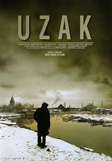
|
|
Plot
of 'Distant' can't live up to Turkish vistas
Gary Arnold, THE WASHINGTON TIMES (USA), 22.07.2004
"Distant," exclusively at the Landmark E Street Cinema, revives
the city-mouse-country-mouse contrast in what should be an exotic setting
for most moviegoers: a wintry Istanbul. Because the Turkish filmmaker
Nuri Bilge Ceylan has more scenic flair than domestic comedy aptitude,
however, it's more rewarding to contemplate landscapes or cityscapes than
to wait out the central relationship, which fails to ripen or sour in
a clever variety of ways.
Mr. Ceylan is not given to explanations
while observing the climate of estrangement permeating the apartment of
a saturnine photographer, Mahmut (Muzaffer Ozdemir), when a younger relative,
Yusuf (Emin Toprak), arrives from the boondocks seeking work and encouragement.
The visitor's initial hope is to
land a job on a ship's crew, but his approach to the job market proves
desultory at best. For the most part, he ends up hanging around, until
discouragement and his host's simmering hostility force a departure.
Accustomed to solitude, Mahmut
makes it clear that his tolerance for company is likely to wear thin after
making token efforts at hospitality. There are throwaway remarks that
suggest Mahmut idolized the Russian filmmaker Andrei Tarkovsky and might
have once entertained cinematic aspirations of a comparable gravity.
He overpays Yusuf to serve as an assistant during a shoot at a mosque
outside the city. The helper's failure to catch on immediately to the
tasks at hand is an instant black mark. His delight in a prompt cash reward
makes him seem even more the hapless hick to Mahmut, the world-weary cosmopolitan.
The movie would have more dramatic traction if there were some doubt about
Mahmut's ability to tolerate intrusion and Yusuf's ability to ingratiate
himself, but developments of this kind seem to be outside Mr. Ceylan's
range of curiosity.
"Distant" won a pair of awards at the 2003 Cannes Film Festival,
including a teamwork "best actor" prize for Mr. Ozdemir and
Mr. Toprak that may have been generous to a fault. You're not at all sure
whether they're actors or indispensable non-pros.
The movie's first composition may have placed Mr. Ceylan, who is also
his own cinematographer, in contention for the "grand jury"
edition of the best film awards. It's a magnificent early morning landscape,
with a village softly illuminated across the top half of a spacious shot
and a snow field arrayed across the bottom half. A distant figure, later
deduced as Yusuf, is trudging across the field toward the foreground.
I'd have preferred a closer look at the village before the scene is abandoned.
I also wish Yusuf would ask Mahmut about the freighter tilted on its side
along the Istanbul riverfront. It's always useful to be reminded that
no one should overstay his welcome, but Yusuf would make a stronger case
for extending his if he combined more curiosity with a talkative streak.
Mr. Ceylan indulges a deadpan sight gag that also serves as an incisive
criticism of the movie. He contrives to have both men abandon the living
room briefly, leaving us alone with the television set. It does seem tempting
to change the channel or quietly slip out of the apartment.
|

